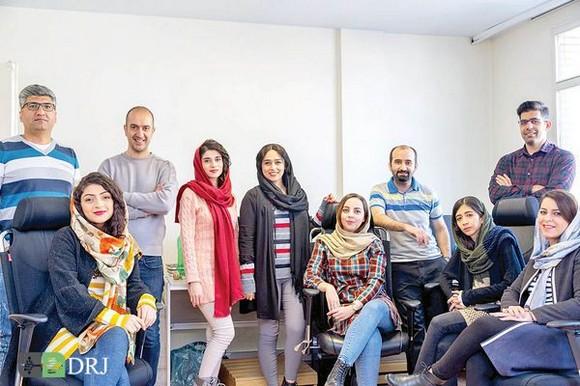In 2018, 71 percent of employers have plans to increase their hiring rates in the next 12 months and 66 percent are optimistic about the year-on-year market activity for their businesses.
These figures are taken from a research conducted by Hays Group for the Middle East region, and they are a positive indicator that Middle Eastern employers are poised to add a substantial number of job opportunities — but which sector will be the main growth driver in the job market?
To answer this question, we decided to analyze job listings data (job ads) extracted from job site Bayt.com. The job board included close to 69,000 job postings. The study relied on both the category and location of the job.
The new challenger in the job market
The analysis of the “job category” field can give us the break-up of the number of job domains in which job ads are getting listed. Below is the resulting chart:
There are three primary domains that attract the highest number of recruits in the Middle East: oil and gas, information technology, and retail.
What’s even more interesting is the fact that Information Technology (IT) is closely trailing the “oil and gas” domain, a sector that has been traditionally attracting most of the talents to the region.
The catalyst for technology jobs
To zoom in on the factors contributing to the growth in the tech job market, we looked at the cities with higher workforce demand. This brings us to the analysis of the “job locations” field:
The chart shows that Dubai, Riyadh and Kuwait are the top three cities.
We can also see that two cities from the UAE are in the top six, which essentially reveals that the UAE is the primary driver of jobs in the region. The second in line is Saudi Arabia. This same pattern is also seen within technology jobs. Now, let’s go through the two vital elements that are contributing to job growth.
Digital transformation
The Middle East, especially the GCC countries is undergoing a massive transformation via digitization. This is directly impacting the demand for a robust digital infrastructure and the emergence of a vibrant tech ecosystem; hence, skilled workforce will play a pivotal role in this process. As companies’ awareness of digital transformation is steadily increasing, they are considering IT to be an intrinsic business growth driver.
This is a two-way process. While the talented workforce promotes digitization, the tech sector further produces job opportunities. According to a research done by Strategy&, an enhanced digital job market has the potential to create 1.3 million additional jobs in the GCC by 2025, including 700,000 in Saudi Arabia alone.
For instance, Dubai is hosting the World Expo in 2020, which has the theme of "Connecting Minds, Creating the Future" and subthemes of sustainability, mobility and opportunity. This is a prime example of UAE’s technology-driven vision for the future. We can also look at Saudi Arabia’s 2030 vision, which has multiple references to technology as a bedrock for the development of society, healthcare, economy, national security...etc. To that end, the Saudi Federation for Cyber security, Programming and Drones has recently made an agreement with Google to establish five innovation hubs in Saudi Arabia.
Apart from that, there is a massive push towards establishing smart cities as the governments need to provide the growing population with adequate infrastructure. International Data Corporation (IDC) has reported that spending on the technologies that enable Smart City initiatives is forecast to reach $1.26 billion for the Middle East and Africa (MEA) region in 2018.
Economic outlook and reforms
One of the crucial factors of economic reforms is the fluctuations in oil prices. Despite the sharp rise witnessed in 2018, oil prices have remained relatively lower in the last four years. Since oil cannot be a long-term player, governments are exploring other smart energy solutions, including renewable energy, and various avenues to build a robust economic growth. For example, apart from the UAE and Saudi Arabia, in countries such as Bahrain there is a trend towards building startup hubs and fintech ecosystems where investment is driven by both the private and public sectors. These include Tamkeen, Bahrain’s labor fund, Bahrain Development Bank, and other accelerators such as C5 and CH9.
Overall, there is a steady growth in countries like the UAE (the highest in the GCC region) that has been leading to the creation of more jobs. Riyadh has also picked up the pace thanks to the country’s new economic policies. For instance, the structure for bankruptcy has been framed in a way that allows entrepreneurs to move easily towards a new business development while encouraging direct foreign investments. Although there are numerous components in this law, the key lies in the option to opt for out-of-court liquidation, court-supervised settlement to rescue businesses, financial restructuring via court to help struggling businesses, and bankruptcy via sale of assets.
There is another policy change involving the Saudi guardianship system that has been incorporated: Now, women will be able to start businesses without the permission of men (father, husband, brother...etc.) In terms of labor laws, there have been welcome moves very recently undertaken by UAE and Oman to facilitate employment in part-time jobs alongside full-time jobs.
Middle Eastern countries have been continuously overcoming challenges since the Arab Spring. The region is moving towards better economic stability, growth is picking up, inflation is in check, and the public debt level is going down in most of the countries.
In this scenario, increasing job growth in tech sector entails more gigantic steps made by countries to move towards greater digitization. The goal should be to help organizations leverage more cutting-edge technologies and implement digital strategies to overhaul their business processes. Fostering innovation and enabling a digital entrepreneurship ecosystem in the regional economies must be the way to leverage the IT and communication wave for a long-term growth.

ایده ها برای استارت آپ موجب رونق کسب و کارهای اینترنتی
آینده / استارت آپ

استارتآپها ادبیات بازار سرمایه را بلدند؟
استارت آپ

صدور تاییدیه دانش بنیانی شتابدهنده صدر فردا
اخبار / استارت آپ

اپلیکیشن شارژاپ
گوناگون / استارت آپ / رپرتاژ آگهی / بازتاب

جذابترین ایدههای B2B در سال 2020
استارت آپ

تعریف استارت آپ startup
دانشنامه / استارت آپ / مقاله

۱۰ استارتاپ که بدون سرمایه به سوددهی رسیدند
استارت آپ

ایده ها و پیشنهاد برای استارت آپ در سال جدید
راهکارها و ترفند ها / استارت آپ

استارتآپ ایرانی؛ مرجع اول زنان افغان
استارت آپ

شروع یک کسب و کار نوپا پلتفرمی
استارت آپ

برنامه شبکه اجتماعی تیندر
گوناگون / معرفی وب سایت / استارت آپ

10 استارت آپ برتر تاکسیرانی جهان
استارت آپ

پخت پیتزاهای هیجان انگیز با هوش مصنوعی
آینده / استارت آپ

ایده های استارتاپی فراموش شده
دورنما / بازار / استارت آپ

اپل، استارتاپ فناوری خودران Drive.ai را تصاحب کرد
استارت آپ

بررسی مهمترین چالشهای تیمهای استارتاپی
استارت آپ

نگرانی کاربران از هزینه تعمیر و تامین قطعات
گفت و گو / بازار / استارت آپ

مصاحبه با مدیرعامل و بنیانگذار استارتاپ Moz
گفت و گو / استارت آپ

آشنایی با استارت آپ های حوزه مدیریت آب
استارت آپ

راه اندازی ۷۰ استارت آپ توسط نخبگان ایرانی
استارت آپ

معرفی هشت استارتآپ موفق ایرانی در حوزه فینتک
استارت آپ

اولین مرورگر شرعی دنیا
استارت آپ

از صفر تا پیست
استارت آپ

معرفی برترین استارتاپهای CES 2019
اخبار / استارت آپ

ازدواج با فرد ثروتمند یا خوش اخلاق
سبک زندگی / برترین ها

هدف از تشکیل خانواده چیست
سبک زندگی

اول عاشق شویم، بعد ازدواج کنیم
سبک زندگی

خانواده چیست
سبک زندگی

مشاوره خانواده چیست؟
سبک زندگی

اولویتهای پسانداز خانواده چیست؟
سبک زندگی

هزینه های خانواده چیست؟
سبک زندگی

راهکار بیشتر حرف زدن اعضای خانواده چیست؟
سبک زندگی

چرخه زندگی و خانواده چیست؟
سبک زندگی

اهداف و اصول تشکیل خانواده
سبک زندگی

آموزش جنسی نادرست به سبک خانم جلسه ای
سبک زندگی

لطفا تماشاچی آزار زنان نباشید!
سبک زندگی

کودک آزاری؛ از نشانهها و دلایل تا درمان
گزارش / سبک زندگی / پرورش کودکان

روش های تعیین هدف و مسیر زندگی برای رسیدن به موفقیت
سبک زندگی
مجله اینترنتی دیپروتد نشریه مجازی بر بستر اینترنت به مسائل آموزشی و مقالات پیرامون کسب وکار های نوپا یا استارت آپ ها و سبک زندگی است فعالیت و محتوای مطالب ارائه شده در سایت همه بیشتر در حوزه مدیریت، کارآفرینی ، روانشناسی ،اقتصادی و فناوری اطلاعات است نام اصلی دیپروتد "ریشه های عمیق " با مجوز رسمی از هیات نظارت برمطبوعات مشغول به فعالیت است
ما را در شبکه های اجتماعی دنبال کنید
تمامی حقوق برای سایت فوق محفوط است.
S-TECH: ایرانی توانمند | Powered by: مجله اینترنتی دیپروتد







